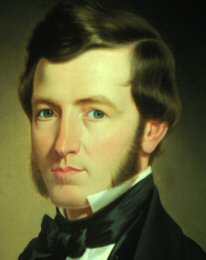<Back to Index>
- Educator Martha McChesney Berry, 1865
- Composer William Billings, 1746
- King of Montenegro Nikola I Mirkov Petrović-Njegoš, 1841
PAGE SPONSOR


William Billings (b. Boston, October 7, 1746 – d. Boston, September 26, 1800) was an American choral composer, and is widely regarded as the father of American choral music. Originally a tanner by trade, and lacking formal training in music, Billings created what is now recognized as a uniquely American style.
"He had one eye, a deformed arm and a harsh voice; he was lame in one leg; and he was addicted to snuff." At
the age of 14 his father's death stopped his formal schooling. He was
married with six children. Billings died in poverty on September 26,
1800. His funeral was announced in the Columbian Centinel "Died -
Mr. William Billings, the celebrated music composer. His funeral will
be tomorrow at 4 o'clock, PM from the house of Mrs. Amos Penniman, in
Chamber - street, West - Boston." Virtually all of Billings' music was written for four part chorus, singing a cappella. His many hymns and anthems were published mostly in book - length collections, as follows: The New-England Psalm - Singer (1770); The Singing Master's Assistant (1778); Music in Miniature (1779); The Psalm - Singer's Amusement (1781); The Suffolk Harmony (1786); The Continental Harmony (1794). Sometimes Billings would revise and improve a song, including the new version in his next volume. Billings' music can be at times forceful and stirring, as in his patriotic song "Chester"; ecstatic, as in his hymn "Africa"; or elaborate and celebratory, as in his "Easter Anthem". The latter sounds rather like a miniature Handelian chorus, sung a cappella. As might be expected from a composer who was very close to his roots in folk music, Billings' music shows a striking purity. His "Jargon," written to a tongue-in-cheek text,
contains jarring dissonances that sound more like those of the 20th
century than of the 18th century. He also wrote several Christmas
carols, including "Judea" in 1778 and "Shiloh" in 1781. Billings
often wrote the lyrics for his own compositions. Like the notes, the
words are occasionally awkward but always forceful and vivid. As an example, McKay and Crawford (see Books, below) compare Billings' metrical rendering of Luke 2:8-11 with that of Nahum Tate, thought to be the inspiration for Billings' work: Tate: Billings: Billings
wrote long prefaces to his works in which he explained (often in an
endearingly eccentric prose style) the rudiments of music and how his
work should be performed. His writings reflect his extensive experience
as a singing master. They also provide information on choral performance practice in Billings's day; for instance, a passage from the preface to The Continental Harmony indicates that Billings like to have both men and women sing the treble (top) and tenor lines, an octave apart: With changes in the public's musical taste, Billings' fortunes declined. His last tune - book,The Continental Harmony,
was published as a project of his friends, in an effort to help support
the revered but no longer popular composer. His temporary employment as
a Boston street sweeper was probably a project of a similar nature. Billings
died in poverty at age 53, and for a considerable time after his death,
his music was almost completely neglected in the American musical
mainstream. However, his compositions remained popular for a time in
the rural areas of New England, which resisted the newer trends in
sacred music. Moreover, a few of Billings' songs were carried southward
and westward through America, as a result of their appearance in shape note hymnals. They ultimately resided in the rural South, as part of the Sacred Harp singing tradition. In
the latter part of the twentieth century a Billings revival occurred,
and a sumptuous complete scholarly edition of his works was published. Works by Billings are commonly sung by American
choral groups today, particularly performers of early music. In addition, the recent spread of Sacred Harp music
has acquainted many more people with Billings' music: several of his
compositions are among the more frequently sung of the works in the
Sacred Harp canon. The Stoughton Musical Society,
formed by former students of Billings, has carried on his tradition for
over 200 years, and included twenty-seven Billings tunes in their 1878
music collection, The Stoughton Musical Society's Centennial Collection of Sacred Music. Among the favorite tunes by Billings sung by this choral society are: "Majesty" and "Chester". The modern American composer William Schuman featured Billings' American Revolutionary War anthem "Chester", along with two other of Billings' hymns, in his composition New England Triptych. William Billings was inducted into the Songwriters Hall of Fame in 1970.